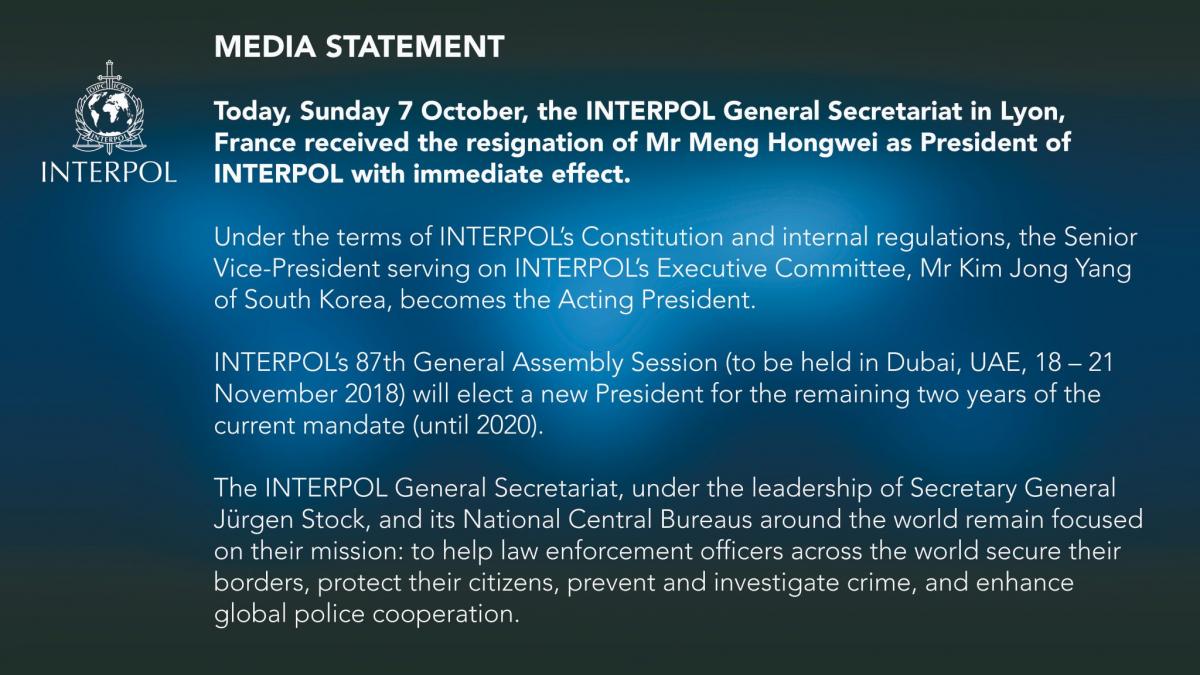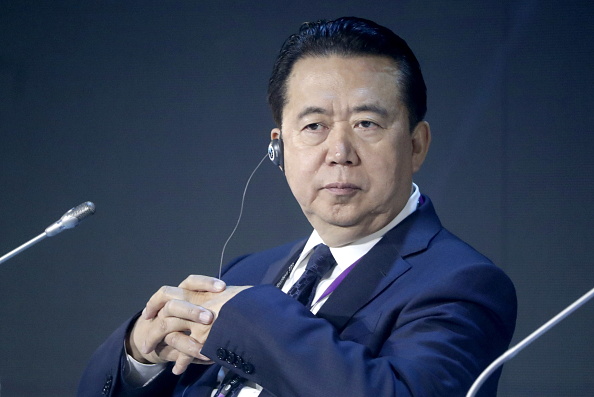What happened to these two individuals and what does it say about China?
THE CURIOUS CASE OF MENG HONGWEI
In November 2016, Meng Hongwei, the PRC’s Vice Minister of Public Security, was appointed as the President of Interpol. He had served in a number of law enforcement-related positions in China before becoming the first Chinese citizen to take the top position at Interpol. His appointment was viewed by many in China as the international community finally accepting it as an equal. Since then, things have not exactly gone according to plan.
In late September 2018, Meng travelled from France back to China. On September 25, he sent his wife, Grace, two texts: one said to wait for his call and the other was a knife emoji. Grace said that the knife meant he was in danger, and Meng has not sent another text since then. On October 4, she reported him missing. On October 5, Interpol released a statement, “We are aware of media reports on connection with the alleged disappearance of INTERPOL President Meng Hongwei. This is a matter for the relevant authorities in both France and China.” The next day, another statement said that Interpol “has requested through official law enforcement channels clarification from China’s authorities on [Meng’s] status.” Then, on October 7, Interpol announced that Meng has resigned from his position.

The China Daily reported that Meng was being investigated for “taking bribes and breach of law.” No further details were given. PRC Minister of Public Security Zhai Kezhi said in a statement, “The investigation of Meng is very timely . . . which shows that there’s no privilege or exception in face of law, and no person can escape punishment if he or she violates the law.”
Grace Meng said to CNN that she received a phone call from an unknown individual threatening her life about one week after Meng disappeared. The man said, “You listen, but you don’t speak. We’ve come in two work teams, two works teams just for you.” Grace and her two sons are now under the protection of the French police. The public nature of her demand for information about her husband is rare for a Chinese citizen, but her presence outside of China gives her latitudes and protections that she otherwise would not have.
Things obviously do not look good for Meng as China’s conviction rate is 99%. But because he is a high-level official being investigate for corruption, his case is treated differently than the average citizen. The National Supervisory Commission (NSC), which is Xi Jinping’s anti-corruption agency and is independent of the PRC courts, handles these types of cases. The NSC was added to the PRC constitution in February 2018—giving it immense power. Under Xi’s anti-corruption campaign, over 1.5 million PRC officials have been targeted.
The NSC also “operates a new detention system called ‘liuzhi.’” Under liuzhi, retention in custody, the NSC can deny the accused access to an attorney and can deny them the ability to contact family for up to six months. Under this system, families are supposed to be notified within 24 hours of someone being taken into custody. It is not likely that Meng is being treated well while in custody—as China has reputation for abusing and torturing detainees.
The disappearance and detention of Meng was a calculated moved on Beijing’s part. Even though China has detained a number of high-profile individuals in the CCP and in the military, Meng is first one to head an international organization. The CCP—and Xi—knew that disappearing Meng would take the spotlight. Now, many are questioning whether Chinese citizens should ever lead another international organization.

FROM CHINA’S DARLING TO TAX EVADER
While Meng’s case is currently ongoing, Fan Bingbing’s issues with the law and the CCP recently ended. Coincidentally (or not), Fan resurfaced the day after Meng was reported missing. Fan, who has had roles in American blockbusters like Iron Man 3 and X-Men: Days of Future Past and has worked for many luxury brands like Louis Vuitton and Cartier, is China’s highest paid actress. She disappeared in July and resurfaced in October. Her disappearance, like Meng’s, took the world by storm. The entertainment world, human rights activists, and China researchers all united in wondering what happened to Fan Bingbing. Comparisons were made about what would happen if Jennifer Lawrence or Emma Stone fell off the map for three months.
When she resurfaced, Fan admitted to tax evasion and had to pay about $130 million in back taxes and fines to the CCP. The CCP has been cracking down on a practice in the entertainment industry known as yin-yang contracts, whereby a studio and actor make two contracts: an official one to report for taxes and an unofficial one with a higher salary hidden from the government. Fan admitted to signing yin-yang contracts. She reportedly hid $6 million in one contract alone. Due to her ubiquitous presence in China, it is likely that the CCP used Fan to set an example to the rest of the entertainment industry—even the most famous cannot escape the law.
During her disappearance, “Chinese academics awarded her a shocking score of zero in an annual state-sanctioned report ranking the ‘social responsibility’ of Chinese celebrities, presaging her spectacular fall from grace.” The ranking pointed to legal problems that would later be revealed.

On October 3, Fan released an apology on her Weibo account. It said,
Recently I have endured an unprecedented amount of pain, undergoing deep self-reflection and introspection. I feel ashamed and guilty for what I did, and here, I offer my sincere apology to everyone. . . . I shouldn’t have lost my ability to govern myself in the face of economic interests, leading myself to break the law. Here I sincerely apologize to society, friends who care about me, the public and the taxation authorities.
The CCP has set a deadline of December 31, 2018 for anyone else to pay any taxes on hidden money without incurring a penalty. It also changed compensations rules for the entertainment industry. According to the New York Times, “No one actor can now earn more than 70% of what the entire cast makes or more than 40% of production costs of a movie.”
What Fan did was illegal, but the way in which the CCP disappeared one of the most visible Chinese citizens demonstrated that it cares little for legal norms. All the CCP cares about is sending a message to anyone who thinks it is above the party.
WHAT WILL HAPPEN NEXT?
The disappearances of both Fan and Meng took the world by storm. They have hurt China’s image internationally as movie studios, which are trying to make in-roads into the growing Chinese movie market, may be more reluctant to cast famous Chinese actors and actresses. Whoever gets hired for a movie could disappear without a trace at any moment. The same can also be said of any international organization. The head of the International Civil Aviation Organization, Fang Liu, is a Chinese citizen. The international community must wonder what the CCP will do to her since the party brazenly disappeared the head of the agency that coordinates international police cooperation. And the cases of Fan and Meng are only of people in the spotlight. It does not include the up to one million Uyghurs detained in western China or the human rights activists arrested without any global outrage.
China’s legal system is immensely flawed, to say the least, so the United States and other governments may become more vocal about the CCP’s actions. The international community will be on high alert for suspicious disappearances and murders—it is just a matter of whether or not Xi Jinping will care enough about the outcry to change course.









